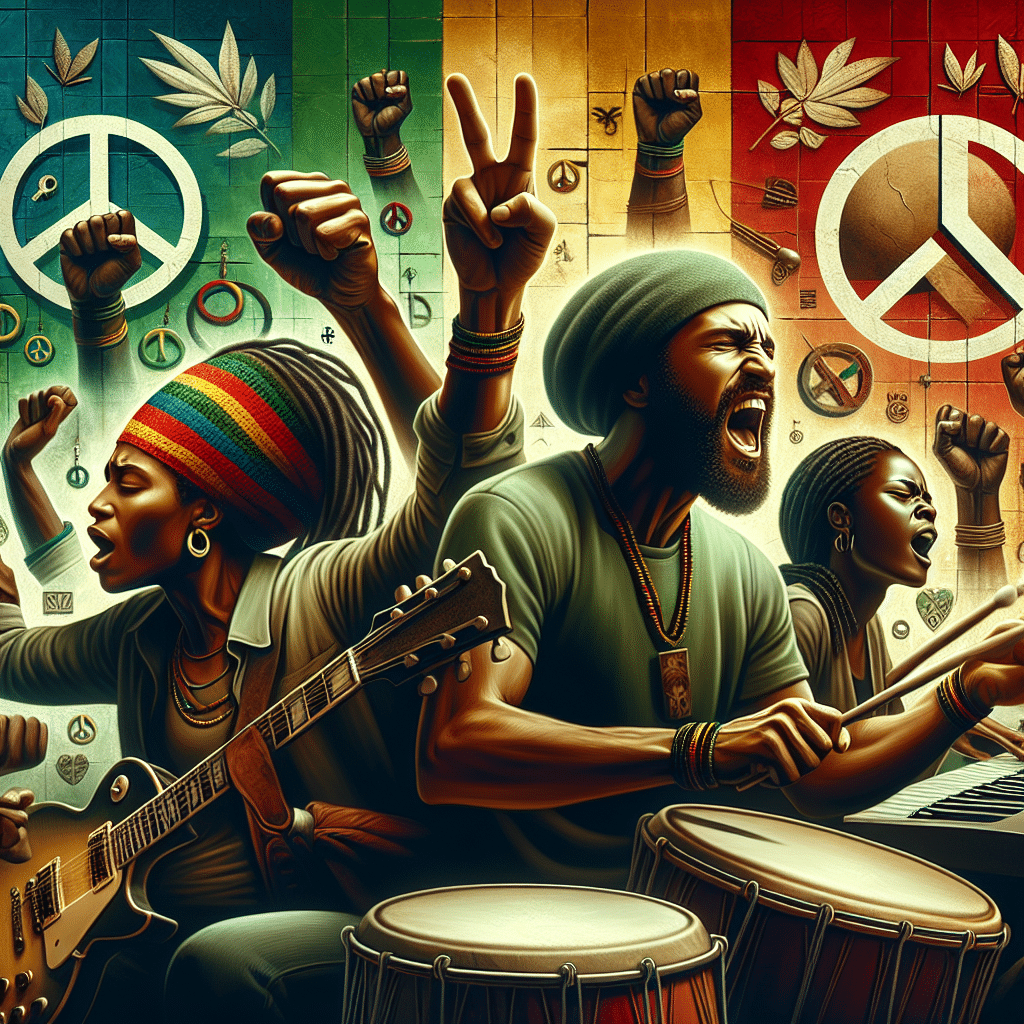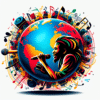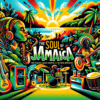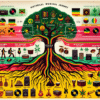The Rhythm of Resistance: How Reggae Beats Define Culture and Change

Reggae music, born in Jamaica in the late 1960s, is much more than a genre; it's a cultural phenomenon and a voice of resistance. The pulsating rhythms, powerful lyrics, and soulful melodies of reggae reflect a rich tapestry of cultural heritage and social struggle. This article explores the significance of reggae as a powerful tool for social change, examining its roots, evolution, and lasting impact on culture and politics.
- The Roots of Reggae: A Historical Overview
- The Power of Lyrics: A Voice for the Oppressed
- Cultural Identity and Global Influence
- Social Movements and Political Activism
- The Healing Power of Reggae: Unity and Spirituality
- The Evolution of Reggae: New Genres and Future Directions
- Conclusion: The Enduring Significance of Reggae
- FAQs
The Roots of Reggae: A Historical Overview
Reggae emerged from a rich musical landscape in Jamaica, influenced by traditional folk music, jazz, R&B, and ska. In the wake of colonialism and social upheaval, the genre became a vehicle for marginalized voices. Key figures like Bob Marley, Peter Tosh, and Jimmy Cliff popularized reggae worldwide, infusing their music with messages of social justice, love, and resistance.
The term "reggae" itself is believed to be derived from the Latin term "reggae-reggae," meaning "the ruckus" or "the struggle," which perfectly encapsulates its ethos. Through its infectious beat and compelling narratives, reggae called attention to socio-political inequities, echoing the sentiments of those who felt voiceless. This layered historical context sets the stage for understanding reggae as a rhythm of resistance.
See Also: From the Islands to the World: The Evolution of Reggae Music
From the Islands to the World: The Evolution of Reggae MusicThe Power of Lyrics: A Voice for the Oppressed
Reggae’s lyrics resonate deeply with themes of struggle, survival, and hope. Songs often address issues such as poverty, inequality, and systemic injustice, effectively bridging the gap between the artist and the listener. Bob Marley’s iconic tracks like "Get Up, Stand Up" and "One Love" connect listeners to a broader struggle, encouraging unity and action against oppression.
The use of local dialect and vernacular in reggae lyrics also plays a crucial role in its cultural significance. This linguistic choice creates an authentic connection to Jamaican identity, making the music a source of national pride and resistance against colonial narrative frameworks. Reggae empowers the oppressed by asserting their stories, feelings, and dreams through compelling and relatable narratives.
Cultural Identity and Global Influence
See Also: From Jamaica to the World: The Impact of Reggae Icons on Global Music
From Jamaica to the World: The Impact of Reggae Icons on Global MusicReggae serves as a mirror reflecting the cultural identity of Jamaica. It boasts a deep connection with Rasta philosophy—a spiritual movement that emphasizes the importance of African heritage and social justice. This connection fosters a unique identity that transcends geographical boundaries, allowing reggae to influence and fuse with various global music styles.
From the streets of Kingston to the lounges of London and the neighborhoods of New York, reggae found resonance across the globe. The fusion of reggae with hip-hop, rock, and electronic music bears witness to its adaptability and widespread appeal. Artists like Sean Paul and Major Lazer broadened reggae's reach further, merging it with contemporary genres and reaching new audiences. The resulting cultural exchanges lead to a global narrative of resistance, inspiring movements worldwide.
The influence of reggae extends beyond the realm of music; it has played an active role in political activism and social change. In the 1970s, during Jamaica's turbulent political climate, reggae was a form of protest against corruption and violence. Artists used their platforms to campaign for change, mobilizing communities and raising awareness about human rights violations.
See Also: From Jamaica to the World: The Global Impact of Reggae Beats
From Jamaica to the World: The Global Impact of Reggae BeatsReggae's legacy as a tool for activism can be seen in movements such as the Black Lives Matter campaign, where reggae music reverberates as an emblem of resistance against racial injustice. The resilience encapsulated in reggae beats inspires activists worldwide, serving as a rallying cry for social justice.
The Healing Power of Reggae: Unity and Spirituality
Beyond its political themes, reggae also encapsulates messages of love, unity, and spirituality. Tracks like "Three Little Birds" convey optimism and encourage listeners to overcome adversity with a sense of hope. This duality—addressing hardship while promoting healing—is fundamental to reggae's appeal and longevity.
The communal aspect of reggae performances, often characterized by dance and collective participation, reinforces a sense of togetherness. Festivals, concerts, and community gatherings foster social bonds and encourage dialogue about pertinent issues, thus creating a supportive environment for change.
See Also: Rooted in Rhythm: Exploring the Evolution of Reggae Beats
Rooted in Rhythm: Exploring the Evolution of Reggae BeatsThe Evolution of Reggae: New Genres and Future Directions
As the world changes, so does reggae. New subgenres, such as dancehall and reggaeton, reflect contemporary issues while maintaining the core ethos of resistance. Artists like Shabba Ranks and Vybz Kartel, while diverging from traditional reggae forms, carry forward the spirit of empowerment and social critique.
Today, reggae continues to evolve, often blending with digital platforms, allowing emerging artists to share their messages with a global audience. The rise of music streaming services has also contributed to the resurgence of interest in reggae, introducing new generations to its rich legacy and transformative power.
Conclusion: The Enduring Significance of Reggae
The rhythm of resistance that reggae embodies is transcendent. This unique musical form has not only documented the struggles and triumphs of Jamaica but has also become a universal symbol for social change and activism. The beats of reggae define culture and challenge societal norms, reminding us that music can ignite passion, foster community, and influence change.
See Also: The Soul of Jamaica: How Reggae Legends Shaped a Cultural Movement
The Soul of Jamaica: How Reggae Legends Shaped a Cultural MovementReggae's ability to articulate the struggles of the marginalized is as vital today as it was at its inception. As we navigate complex social issues in the modern world, the importance of reggae lies in its capacity to inspire action, promote unity, and create spaces for dialogue—a testament to its enduring relevance.
FAQs
Q1: What are the origins of reggae music?
A1: Reggae originated in Jamaica in the late 1960s, evolving from genres like ska and rocksteady, influenced by jazz, R&B, and traditional Jamaican folk music.
See Also: Legends of the Lane: Celebrating Jamaica's Iconic Reggae Artists
Legends of the Lane: Celebrating Jamaica's Iconic Reggae ArtistsQ2: How has reggae influenced social movements?
A2: Reggae music has historically been used as a platform to speak out against injustice and inequality, inspiring social movements like the African American civil rights movement and the Black Lives Matter movement.
Q3: Who are the most influential reggae artists?
A3: Prominent reggae artists include Bob Marley, Peter Tosh, Jimmy Cliff, Burning Spear, and more contemporary figures like Sean Paul and Damian Marley.
Q4: How does reggae connect with Rasta philosophy?
See Also: Roots of Rhythm: Exploring the Evolution of Jamaican Reggae Music
Roots of Rhythm: Exploring the Evolution of Jamaican Reggae MusicA4: Reggae often reflects the themes of Rastafarianism, including a focus on African heritage, social justice, and spirituality, making it an essential part of Rasta culture.
Q5: What role does reggae play in modern culture?
A5: Reggae continues to evolve and influence contemporary music, connecting cultural identities globally while serving as a powerful medium for social commentary and change.
If you want to know other articles similar to The Rhythm of Resistance: How Reggae Beats Define Culture and Change you can visit the category Reggae.
